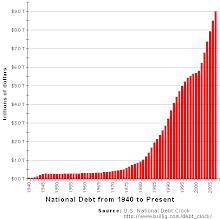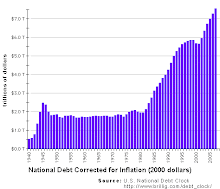Monday, March 3, 2008
The Economic Perspective on Tradeoffs
A tradeoff is an exchange of one thing in return for another. Economists often express the concept of tradeoffs as “there is no such thing as a free lunch.” Even if one person does not pay for lunch, someone incurred the costs of growing, preparing, and serving the food.
Economists believe tradeoffs always exist and that they should be explicitly considered when making choices. Others, including many politicians, frequently ignore tradeoffs.
To illustrate how people ignore tradeoffs, consider the Tax Reform Act of 1986, which was designed to generate the same level of revenue for the federal government by increasing the federal taxes levied on businesses when it decreased individual income taxes. Many people reveled in this perceived reduction in their taxes. Economists have a different perspective, however. If corporations are required to pay more in taxes, then the money to pay these higher taxes must come from somewhere. This is a tradeoff. Corporations could obtain additional income for their increased taxes by charging higher prices for their products, by paying workers less in wages and salaries, or the taxes could result in reduced corporate profits.
If product prices increase, then the increase in corporate income taxes is partially borne by consumers. Similarly, if the change in tax structure causes businesses to pay workers less (or to increase their pay more slowly), then workers are bearing part of the burden of the increased corporate income taxes. If the taxes result in lower corporate profits, then stockholders receive less when those profits are distributed to them as dividends. More than half of all Americans own stock. To the extent that people are consumers, workers, and stockholders, they are still paying for the taxes, even though the structure changed. Economists argue that people should not have been quite as excited about the change in the tax structure since it resulted in higher product prices, slower wage increases, and reduced dividend income.
Oliver Wendell Holmes, the former Justice of the United States Supreme Court, said, "Taxes are what we pay for a civilized society." Regardless of how we structure taxes, ultimately they must be paid by members of society. Remember, there is no such thing as a free lunch!
Economists believe tradeoffs always exist and that they should be explicitly considered when making choices. Others, including many politicians, frequently ignore tradeoffs.
To illustrate how people ignore tradeoffs, consider the Tax Reform Act of 1986, which was designed to generate the same level of revenue for the federal government by increasing the federal taxes levied on businesses when it decreased individual income taxes. Many people reveled in this perceived reduction in their taxes. Economists have a different perspective, however. If corporations are required to pay more in taxes, then the money to pay these higher taxes must come from somewhere. This is a tradeoff. Corporations could obtain additional income for their increased taxes by charging higher prices for their products, by paying workers less in wages and salaries, or the taxes could result in reduced corporate profits.
If product prices increase, then the increase in corporate income taxes is partially borne by consumers. Similarly, if the change in tax structure causes businesses to pay workers less (or to increase their pay more slowly), then workers are bearing part of the burden of the increased corporate income taxes. If the taxes result in lower corporate profits, then stockholders receive less when those profits are distributed to them as dividends. More than half of all Americans own stock. To the extent that people are consumers, workers, and stockholders, they are still paying for the taxes, even though the structure changed. Economists argue that people should not have been quite as excited about the change in the tax structure since it resulted in higher product prices, slower wage increases, and reduced dividend income.
Oliver Wendell Holmes, the former Justice of the United States Supreme Court, said, "Taxes are what we pay for a civilized society." Regardless of how we structure taxes, ultimately they must be paid by members of society. Remember, there is no such thing as a free lunch!
Subscribe to:
Post Comments (Atom)






No comments:
Post a Comment